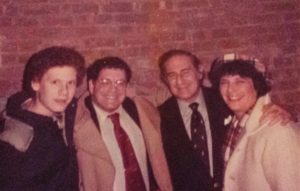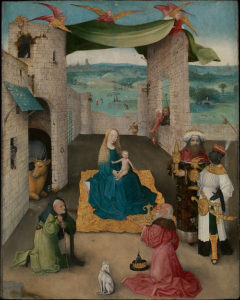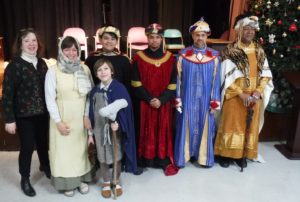
On the afternoon of Sunday, January 8th, Gian-Carlo Menotti’s Christmas opera of Amahl and the Night Visitors was performed at the Mary Manning Walsh Nursing Home on York Avenue near East 72nd Street in New York City. The many Christmas decorations from trees to creches that were at the home made one feel the joys and comforts of the season.
The famed Italian composer Gian-Carlo Menotti (1911-2007) was commissioned by NBC TV to write a Christmas opera. Menotti initially could not find a theme for his opera and labored for many months. Finally, one day while visiting the Metropolitan Museum of Art in New York City, Menotti chanced to see the Hieronymus Bosch painting of “The Adoration of the Magi.” It recalled his boyhood in Italy when he and his brother would eagerly await the gifts left for them by the Three Kings. Suddenly he knew what his opera would be about. The first showing of Amahl on Christmas Eve 1951 drew over 5 million viewers and the opera became an annual television event on NBC. Maestro Gian-Carlo Menotti, who also wrote the lyrics, said that even though he was commissioned to write this opera for television, he really meant it to be a stage work. The great conductor and head of the NBC Symphony Arturo Toscanini, tearfully told Menotti after seeing a dress rehearsal, “this is your finest work.” Judy, Marcello and I were privileged to meet Gian-Carlo Menotti at a special performance of Amahl at the Brooklyn Academy of Music circa 1984.

Amahl is a poor crippled boy who lives in a village with his widowed mother. He is always telling her fibs. One night he tells her of a star with a tail in the sky. Suddenly there is a knock on the door and when Amahl opens it, he tells his disbelieving mother that there is a king. She chastises him for telling lies and future knocks show two kings and when his mother opens the door, it is Three Kings and Amahl exclaimed, “and one of them is black.” The Three Kings are looking for a place to rest for the night for they are seeking a child who will be a Savior to the world. The mother sends Amahl to bring the villagers with food and even dance for their royal visitors. The mother, thinking only of her own child and their poverty, attempts to steal some of the Kings’ gold. She is caught by the Paige and Amahl fiercely defends her. The Kings tell her to keep the gold but the mother returns it. Amahl offers his crutch as a gift to the child and at that moment, a miracle occurs and Amahl walks. He asks if he could accompany the Kings on their journey and his mother gives permission. The final scene is of young Amahl, playing his reed (shepherd’s pipe) and joining the Kings as his mother waves goodbye.
The Amahl for this performance was our grandson Luciano Pantano, age 10. His beautiful treble voice was clear and his diction impeccable. His “double takes” on seeing the Three Kings was ingratiating. His acting was very strong, especially in the scene when he walks again. His running down the aisle in glee after the miracle was contagious. His duets with his mother were flawless and his “Don’t Cry, Mother Dear” aria was touching. Amahl (Luciano’s) queries to the deaf King Kaspar about his pet parrot were charming and his curiosity about the Kings having “royal blood” were amusing. When Amahl asked King Kaspar” is there amongst your magic stones, is there one, is there one that can cure a crippled boy?” It fell on deaf ears. This was done quietly and poignantly.
Kathryn Mensendiek portrayed Amahl’s mother. Her singing of “All that Gold” made for rare drama and was sung with Puccinian relish. Ms. Mensendiek’s scenes with her adored son Amahl, both exasperating and poignant were sung in a rich and expressive soprano. Ms. Mensendiek’s operatic voice was tapered beautifully so that it blended perfectly with the youthful sounds of her Amahl.

(Balthazar) Charles S. Brown, ( Amahl) Luciano Pantano. Photo by Marcello Pantano
The Three Kings were magically sung by bass Charles S. Brown as Balthazar, baritone Alexis Cordero as Melchior and tenor Peter Schmitz as Kaspar. Their blending voices in “Have you seen a Child” was noble and majestic. Kaspar’s “This is my Box” was sung with humor and aplomb and his jubilant singing of “Lovely, lovely, lovely” was very amusing.
The Paige was Asher Yin who played his slightly villainous part with the proper anger, (Thief, thief) then awe, asking the miracle boy Amahl, “Oh Blessed Child may I touch you?”
The Shepherds song was sung by the full choir of the Church of the Transfiguration dressed in peasant garb. Their singing of “Emily, Emily, Michael, Bartholomew” was contagious and joyful. Our granddaughter Leeza was among this talented and tuneful ensemble.
The shy and then exuberant dancers were Goldie Gareza, Mateo Gareza and Gabriela Perez. The dance was choreographed by Jesse Obremski. The audience clapped in cadence to the rhythm of the music and the dancers.
The costumes by Terri Bush were colorful, regal for the Kings and the peasant outfits were earth toned and rustic. Betty Howe was the Stage Manager and Richard Olson was the Stage Director.

Mateo Gareza. Photo by Judy Pantano
As Music Director and piano accompanist, Dr. Claudia Dumschat, encouraged the chorus and principals to do their very best and truly “inspired by example.” Her manifold contributions were invaluable. Dr. Dumschat is also the organist and Music Director at the Church of the Transfiguration also known as “The Little Church Around the Corner” on East 29th Street off Fifth Avenue, a position she has held since 1999. Next year’s Amahl will be in The Church of the Transfiguration with Orchestra. Claudia Dumschat’s Operation Outreach is just a small part of her obligation to the Church and community. To see her conduct, direct, perform and inspire is a joy and wonder. The many musical programs at the Church fully attest to her genius and the impact she has made. To hear and see the chorus, children and adults is to see a rainbow of nationalities united by music – perhaps the greatest unifying force in the world today! The Church of the Transfiguration with the Empire State building in view from the courtyard is a sacred place. Maestro Claudia Dumschat and company truly fulfill the mission of making “a joyful noise unto the Lord.”
The crowded room of seniors applauded and enjoyed this performance. Among the senior residents of Mary Manning Walsh Nursing Home was Claudia’s mother Lizbeth Dumschat.
This opera which runs about 45 minutes should be seen again on television and in churches, auditoriums and opera houses large and small to remind us of what we seem to be lacking today – sentiment, melody and humanity.
Proud parents Marcello and Tatyana Pantano and Luciano’s 5th grade teacher Mariya Ilizirova from the Bambi School in Brooklyn as well as we grandparents, Judy and myself were among the audience of this wonderful performance. Our granddaughter Leeza, who was one of the peasants brought her friend Svetlana Doronkin to see the performance and she was thrilled. Luciano’s Russian grandparents Nikolay and Lubov Klitsenko who visit frequently, teach bayan and chorus in Omsk, Siberia and Luciano’s dad, our son Marcello, is a drummer in a band. Luciano’s Italian (Sicilian) side had mandolinists, guitarists, pianists and vocals. How can he do otherwise?
I, who was known as “The Boy Caruso from Brooklyn,” at age 13 in 1949, yield the crown to my grandson Luciano, named after the famed tenor, the late Luciano Pavarotti. Luciano Pantano, who also plays the bayan, (Russian accordion) and is studying piano with Claudia Dumschat, appears to be another talented Brooklynite on the cusp of a very promising singing and musical career.
